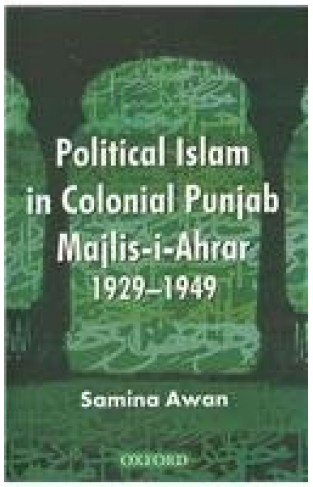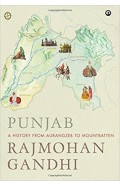- Home
- Young Adults
- Fiction
- Manga, Comics & Graphic Novel
- Political Islam in Colonial Punjab - Majlis-i Ahrar 1929-1949
Political Islam in Colonial Punjab - Majlis-i Ahrar 1929-1949
By: Samina Awan
-
Rs 625.00
Due to constant currency fluctuation, prices are subject to change with or without notice.
for Pakistan movement. Here, region, culture, class, creed, oratory and populist politics combined to unleash a form of agitational pattern which not only politicized Muslims in Punjab and in the adjoining regions, they equally made the urban-rural schisms even more explicit. Using print capital and
espousing trans-regional Islam and composite Indian nationalism, the Ahrar leaders brought a synthesis between the divergent forces of modernity and tradition, yet were overtaken by even larger movements, which offered more comprehensive and competitive programmes. Hemmed in between the Khilafat and
Partition, the MAI offers a unique area to research several important historical issues in the recent South Asian history.
Majlis-i-Ahrar-i-Islam: A Socio-Political Study reveals the centrality of politics of personalities and issues within a broad political and ideological context. It was a brainchild of the middle class, urban Muslim professionals, who espoused a complete independence for India and sought the
empowerment of underprivileged groups both in the princely states and British India. Its appeal banked on traditional modes such as oratory, mosque-based activism and voluntary support obtained in the name of Islam and higher moral values. It tried to make its mark on several fronts and that too
within the most crucial two decades preceding independence and, at times, filled up prisons with its volunteers courting mass arrest.
for Pakistan movement. Here, region, culture, class, creed, oratory and populist politics combined to unleash a form of agitational pattern which not only politicized Muslims in Punjab and in the adjoining regions, they equally made the urban-rural schisms even more explicit. Using print capital and
espousing trans-regional Islam and composite Indian nationalism, the Ahrar leaders brought a synthesis between the divergent forces of modernity and tradition, yet were overtaken by even larger movements, which offered more comprehensive and competitive programmes. Hemmed in between the Khilafat and
Partition, the MAI offers a unique area to research several important historical issues in the recent South Asian history.
Majlis-i-Ahrar-i-Islam: A Socio-Political Study reveals the centrality of politics of personalities and issues within a broad political and ideological context. It was a brainchild of the middle class, urban Muslim professionals, who espoused a complete independence for India and sought the
empowerment of underprivileged groups both in the princely states and British India. Its appeal banked on traditional modes such as oratory, mosque-based activism and voluntary support obtained in the name of Islam and higher moral values. It tried to make its mark on several fronts and that too
within the most crucial two decades preceding independence and, at times, filled up prisons with its volunteers courting mass arrest.
Political Islam in Colonial Punjab - Majlis-i Ahrar 1929-1949
By: Samina Awan
Rs 625.00 Ex Tax :Rs 625.00
Zubin Mehta: A Musical Journey (An Authorized Biography)
By: VOID - Bakhtiar K. Dadabhoy
Rs 840.00 Rs 1,050.00 Ex Tax :Rs 840.00
Punjab: A History from Aurangzeb to Mountbatten
By: Rajmohan Gandhi
Rs 1,165.50 Rs 1,295.00 Ex Tax :Rs 1,165.50
Strange Antics - A History of Seduction
By: Clement Knox
Rs 1,756.00 Rs 2,195.00 Ex Tax :Rs 1,756.00
Beyond Twilight Explore The World Of vampire
By: Manuela Dunn-Mascetti
Rs 276.00 Rs 345.00 Ex Tax :Rs 276.00
Dr Sigmundus: The Cracked Mirror The Promises of Dr Sigmundus
By: Brian Keaney
Rs 2,095.00 Ex Tax :Rs 2,095.00
Punjab: A History from Aurangzeb to Mountbatten
By: Rajmohan Gandhi
Rs 1,165.50 Rs 1,295.00 Ex Tax :Rs 1,165.50
Strange Antics - A History of Seduction
By: Clement Knox
Rs 1,756.00 Rs 2,195.00 Ex Tax :Rs 1,756.00
No recently viewed books available at the moment.
Zubin Mehta: A Musical Journey (An Authorized Biography)
By: VOID - Bakhtiar K. Dadabhoy
Rs 840.00 Rs 1,050.00 Ex Tax :Rs 840.00
Political Islam in Colonial Punjab - Majlis-i Ahrar 1929-1949
By: Samina Awan
Rs 625.00 Ex Tax :Rs 625.00
Punjab: A History from Aurangzeb to Mountbatten
By: Rajmohan Gandhi
Rs 1,165.50 Rs 1,295.00 Ex Tax :Rs 1,165.50
Strange Antics - A History of Seduction
By: Clement Knox
Rs 1,756.00 Rs 2,195.00 Ex Tax :Rs 1,756.00














-120x187.jpg?q6)












-120x187.jpg?q6)



